#i was half way through my third smiths album of the night and decided it wouldn’t make a whole lot of sense not to finish it
Explore tagged Tumblr posts
Text
i knew i had to get to work early today for an important meeting and yet i still only allowed myself 4 hours of sleep 😔
#i was up late sewing#and by the time i remember how to use my sewing machine and successfully hemmed a t shirt#i was half way through my third smiths album of the night and decided it wouldn’t make a whole lot of sense not to finish it#and then suddenly it was 2 am 😔#perhaps even 😓#personal
4 notes
·
View notes
Text
Dust Volume 7, Number 4

Axel Ruley x Verbo Flow
A little bit of optimism is creeping into the air as Dusted writers start to get their shots. We’re all starting to think about live music, maybe outside, maybe this summer. But as the spate of freak snow storms demonstrates, summer’s not here yet, and in the meantime, piles of records and gigs of MP3s beckon. This early spring version of Dust covers the map, literally, with artists representing Pakistan, Australia, Canada, Sweden, the UK and the USA, and stylistically with jazz, rock, punk, rap, improv and many other genres in play. Contributors include Jennifer Kelly, Justin Cober-Lake, Bill Meyer, Ray Garraty, Patrick Masterson, Tim Clarke and Bryon Hayes.
Arooj Aftab — Vulture Prince (New Amsterdam)
Vulture Prince by Arooj Aftab
Arooj Aftab is a classical composer originally from Pakistan but now living in Brooklyn. Vulture Prince, her third full-length album, blends the bright clarity of new age music with the fluid, non-Western vocal tones of her Central Asian roots. “Last Night,” from an old Rumi poem but sung mostly in English, lilts in dub-scented syncopation, the thump and pop of stand-up bass underlining its bittersweet melody. An interlude in some other language shifts the song entirely, pitting vintage reggae reverberation against an exotic melisma. “Mohabbat” (which is apparently Urdu for sex) soothes in the pristine instrumentals, lucid guitars, a horn, scattered drumbeats, but smolders and beckons in the vocals. None of these tracks feel wholly traditional or wholly Western and modern day, but sit somewhere in a well-lit, idealized space. Timeless and placeless, Vulture Prince is nonetheless very beautiful.
Jennifer Kelly
Assertion — Intermission (Spartan)
youtube
Intermission comes from an alternate timeline. Founding drummer William Goldsmith started his musical career in Sunny Day Real Estate and had a notable stint with Foo Fighters. To cut the biography short, Goldsmith took a decade off from the music industry. He's returned now with Assertion, joined by guitarist/vocalist Justin Tamminga and bassist Bryan Gorder (both of Blind Guides, among other acts). This band picks up in the late 1990s, imagining a new path for post-hardcore/post-grunge music. The trio's name suits, as the songs' energy and the lyrical assertiveness develops the intensity of the release. The group works carefully with dynamics, neither parroting the loud-quiet tradition nor simply pushing their emo leanings toward 11.
“The Lamb to the Slaughter Pulls a Knife” epitomizes the album. The track sounds like Foo Fighters decided to get dirtier rather than more arena-friendly, while the lyrics mix violence with emotional persistence. First single “Supervised Suffering” finds triumph in endurance, turning the aggressive chorus into something of a victory. “Set Fire” closes the album with something more delicate, but it's just the gauze over a seething anger. Goldsmith's time off seems to have served him well, as does collaborating with some new partners. Assertion makes its case clearly and effectively, and if the intermission's over for Goldsmith, the second half sounds promising.
Justin Cober-Lake
Michael Beach — Dream Violence (Goner/Poison City)
Dream Violence by Michael Beach
“De Facto Blues,” from Michael Beach’s fourth solo album, is a barn-burner of a song, rough and messy and passionate, the kind of song that makes you want to take a stand on something, who cares what as long as it matters to you. It snarls like Radio Birdman, slashes like the Wipers and follows its muse through chaos to righteousness like an off-cut from Crazy Horse, just back from rockin’ the free world. It’s got Matt Ford and Inez Tulloch from Thigh Master on guitar and bass, respectively, Utrillo Kushner from Colossal Yes (and Comets on Fire) on drums, and Kelley Stoltz at the boards, and it’s a killer. The rest of the album is varied and, honestly, not uniformly astounding, but there’s a nice Summer of Love-style psych dream in “Metaphysical Dice,” a slow-burning post-rocker in the title track and a driving, pounding punk anthem in the opener “Irregardless.” Beach has been splitting his time between San Francisco and Melbourne, Australia, and lately settled on Melbourne, where he will fit like a native into their thriving punk-garage scene.
Jennifer Kelly
Bloop — Proof (Lumo)
Proof by BLOOP (Lina Allemano / Mike Smith)
The trumpet is already a catalog of sound effects waiting to happen, and Lina Allemano knows the table of contents by heart. So, to shake things up, she has paired up with electronic musician Mike Smith, who contributes live processing and effects to Allemano’s improvisations. A blind listen to Proof might leave you with the impression that you’re hearing a horn player jamming with some outer space cats, and we’re not talking about hip, lingo-slinging jazz dudes. In fact, everything on these eight tracks happened in real time. Smith’s a strategic intervener, aware that too much sauce can spoil the stew, so he mixes up precise layering and pitch-shifting with more disorienting transformations. It’s hard to say how much Allemano responds to the simulacra that surround her brass voice, but there’s no denying the persuasiveness of her melodic and timbral ideas.
Bill Meyer
Bris — Tricky Dance Moves (TrueStory Entertainment)
youtube
Bris left some music behind when he died in 2020, but it took almost a year to shape these recordings into a proper CD. The label CEO Mac J (a fine artist himself) could easily capitalize on his friend’s death, stacking Tricky Dance Moves with features from the artists Bris never would have worked with. Yet the album was prepared with the utmost care, not giving an ugly Frankenstein monster feel. Bris’s references to his possible early death are scattered throughout the whole tape: “Heard they wanna pop Bris cause they mad I’m poppin.” Almost every song could be easily turned into a prophetic tale (a cheap move one wants to avoid at all costs). Nonetheless, something is missing here. Or maybe it is just an image of death that disturbs the whole picture, making us realize that this is the last we’d hear from Bris.
Ray Garraty
Dreamwell — Modern Grotesque (self-released)
Modern Grotesque by Dreamwell
I recently read an interview with Providence’s Dreamwell breaking down in almost excruciating detail the influences that led to the quintet’s sophomore full-length Modern Grotesque. I kept scrolling past Daughters and Deftones and Deafheaven and increasingly disconnected influences like The Mountain Goats and Nina Simone. I went back to the top and looked again. I typed Ctrl+F and put in “Thursday.” Nothing. This is preposterous. I may not be in the post-hardcore trenches the way I once was, but even I’d know a good Full Collapse homage if it swung a mic right into my face the way this one did; hell, just listen to “The Lost Ballad of Dominic Anneghi” and tell me singer Keziah Staska doesn’t know every single word of “Paris in Flames.” That may not look like flattery on a first read, but too often, bands striding the emo/pop divide have chased the latter into sub-Taking Back Sunday oblivion; what Thursday did was much harder, and Dreamwell has ably taken up the torch here. That they did it unintentionally is a curious, bewildering footnote.
Patrick Masterson
Paul Dunmall / Matthew Shipp / Joe Morris / Gerald Cleaver — The Bright Awakening (Rogue Art)
youtube
It’s a bit perplexing that reeds player Paul Dunmall hasn’t spent more time playing with American musicians. He’s firmly situated within the English improvisation community, where he’s perhaps best known for his longer tenure with the quartet Mujician, and his ability to double on bagpipes has allowed him to establish links between improvised and folk music. But
his jazz-rooted approach makes him a natural to work in settings such as this one. When Dunmall toted his tenor to the Vision Festival in 2012 (even then, it could be costly to lug multiple horns on a plane), he found three sympatico partners in Fest regulars pianist Matthew Shipp, double bassist Joe Morris and drummer Gerald Cleaver. They all hit the ground running, generating a barrage of pulsing, roiling sound for over 20 minutes before the piano and drums peel off, leaving Morris to sustain momentum alone. Dunmall’s gruff, spiraling lines find common cause with each of his fellows, and the gradual addition and subtraction of players from that point makes it easier to hear the exchange of ideas, which often seem to take place between dyads operating within the larger flow.
Bill Meyer
Editrix — Tell Me I’m Bad (Exploding in Sound)
Tell Me I'm Bad by Editrix
Wendy Eisenberg’s rock band is like her solo output in that it snarls delicate, self-aware, mini-short stories in complex tangles of guitar, hemming in high, sing-song-y verses with riffs and licks of daunting difficulty. The main differences are speed, volume and aggression (i.e. it rocks.) and a certain communal energy. That’s down to two collaborators who can more than keep up, Josh Daniel on surging, rattling, break-it-all-down percussion and Steve Cameron, equally anarchic and fast on bass. The title track is an all-out rager, thrusting jagged arena riffs of guitar and bass forward, then clearing space for off-kilter verses and time-shifting, irregular instrumental interplay. “Chelsea” follows a similar chaotic pattern, setting up a teeth-shaking cadence of rock instruments, with Eisenberg keening over the top of it. “I know, perfectly well, that we’re not safe, safe from the men in power,” she croons, engaged in the knotting difficulties of the world as we know it, but winning.
Jennifer Kelly
Elephant Micah — Vague Tidings (Western Vinyl)
Vague Tidings by Elephant Micah
The new Elephant Micah album, the follow-up to 2018’s excellent Genericana, has an apposite title. Vague Tidings conveys an atmosphere of feeling conscious of something carried on the wind, a story passed on that may have shifted through various iterations, leaving only a sense of its original meaning. All that can be sure is that this is sad, sober music, unafraid to brace against the chill of mortality and speak of all that is felt. The instruments — guitar, piano, percussion, violin and woodwinds — move around Joseph O’Connell’s voice in stiff yet graceful arcs, distanced by an unspoken etiquette. Repetitive melodic figures, stark yet steady, gradually accumulate weight as they roll along like tumbleweeds. It’s a crisp, forlorn country-blues, in no hurry to get nowhere, carrying ancient wisdom that seems to acknowledge the empty resonance of its own import.
Tim Clarke
Fraufraulein — Solum (Notice Recordings)
youtube
Fraufraulein’s music is immersive. Anne Guthrie and Billy Gomberg beam themselves, and us along with them, Quantum Leap-style directly into multiple environments in medias res. Through the clever employment of field recordings, they transport us to a hurricane-addled beach, performing a voice/piano duet as driftwood missiles careen through the air. In another “episode,” the manipulation of small objects conjures up the intimacy of a water garden filled with windchimes. Partners in both life and art, Guthrie and Gomberg are also consummate solo artists. He is a master of spike-textured drones, while she explores the intimate properties of physical entities. Like a child tends to resemble one parent while borrowing subtle traits from the other, Solum identifies more with Guthrie’s electroacoustic tendencies than it does with Gomberg’s electronics. This is in stark contrast to 2015’s Extinguishment, which felt a little more balanced between those two modes. Both approaches work, yet Solum feels more meticulously crafted and nuanced. Careful listening unveils multiple subtle tones and textures, and each piece is an adventure for the ears.
Bryon Hayes
Gerrit Hatcher / Rob Magill / Patrick Shiroishi — Triplet Fawns (Kettle Hole)
Triplet Fawns by Gerrit Hatcher / Rob Magill / Patrick Shiroishi
The album’s title implies a crew you wouldn’t want on your yard; while those adolescent ungulate appetites do a number on your bushes, the hooves are hacking up your grass. But if they knocked on your door, saxophone cases in their respective hands, you could do worse than invite them around the back for some blowing. Hatcher, Magill and Shiroishi present with sufficient lung power to be heard fine without the reflective assistance of walls, even when they aren’t making like Sonore (that was Gustafsson, Vandermark, and Brötzmann, about a dozen years back). This album, which was released in a micro-edition of 100 CD-Rs on Hatcher’s Kettle Hole imprint, builds gradually from restrained melancholy to pointillistic jousting to a climactic blow-out, and the assured development of each piece suggests that each player was listening not only to what each of the others was doing, but where the music was headed.
Bill Meyer
A.Karperyd — GND (Novoton)
GND by A.Karperyd
On his second solo release, GND, Swedish artist Andreas Karperyd broodingly ruminates on snatches of musical ideas that have been percolating in his consciousness over extended periods. Anyone familiar with his 2015 debut, Woodwork, will find these 55 minutes similarly immersive, as Karperyd manipulates live instruments such as piano and strings into shimmering, alien tapestries. Opener “The Well-Defined Rules of Certainty” appears to take Fennesz’s Venice as its blueprint, issuing forth cascading, percolating tones that tickle the ears. “The Desire to Invoke Balance with Our Eyes Closed” and “Failures and Small Observations” have a Satie-esque elegance to their piano lines, albeit refracted via a hall of mirrors. The 12-minute “Reminiscence of Tar” sounds like a slow-motion pan across the hulking mass of a shadowy space station. And closing track “Mummification of an Empire” slowly fries its piano in static, then unfurls wistful melodica and throbbing synth across the wreckage.
Tim Clarke
Kiwi Jr. — Cooler Returns (Subpop)
Cooler Returns by Kiwi jr
Kiwi Jr.’s brash, brainy indie pop punk vibrates with nervy energy, like the first Feelies album or Violent Femmes’ 1983 debut or that one great S-T from the Soft Pack. Those are all opening salvos for their respective bands, but this one is a second outing, suffering not a bit from sophomore slackening. Instead, Cooler Returns tightens up everything that was already stinging on the Toronto band’s debut and adds a giddy careening glee. An oddball thread of Robin Hood-ness runs through the disc, with Sherwood forest getting a nod in the title track and “Maid Marian’s Toast” tipping the love interest, but these songs are anything but archaic. “Undecided Voters,” the single jangles harder than anything I’ve heard since Woolen Men, slyly upending creative pretensions in a verse that goes: “You take a photo of the CN tower/you take another of the Honest Ed sign/Well, I take photos of your photos/and they really move people.” Has it been done before? Maybe. Does it move us. Yes indeed.
Jennifer Kelly
Kool John — Get Rich, Die $moppin ($moplife Entertainment)
youtube
A year ago, Kool John was shot six times. Yet you wouldn’t know about it from the general mood of Get Rich, Die $moppin, his first tape since then. He does name one song “6 Shots” and explicitly mentions the shooting accident a few times on other songs, but his bouncy music says he wasn’t hurt bad after all. The beats perfectly match the rhymes, playfully ignorant and ignorantly playful. Kool John still doesn’t mix with broke people, doesn’t return calls if it’s not about money and “doesn’t get stressed out.” Instead, he gets high. His new tape is nothing groundbreaking, even though he’s pretending that is: “If I had no legs I’d still be outstanding.”
Ray Garraty
Nick Mazzarella / Quin Kirchner — See or Seem: Live at the Hyde Park Jazz Festival (Out Of Your Head)
See or Seem: Live at the Hyde Park Jazz Festival by Nick Mazzarella / Quin Kirchner
Perhaps the most remarkable thing about this recording is that the titular festival happened at all. While most festivals either canceled or went on line, Chicago’s Hyde Park Jazz Festival dealt with COVID by spreading out. Instead of big stages and indoor shows, last September it staged little pop-up events on sidewalks and in parks. So, if the sound of See or Seem feels a bit diffuse, it’s because it was recorded with a device propped in front of two guys playing on a grassy median. There are moments when the buzz of bugs rises up for a second behind Nick Mazzarella’s darting alto sax and Quin Kirchner’s brisk, mercurial beats. But the thrill of actually playing in front of some people (or actually being surrounded by them; when there’s no stage and social distancing is in effect, it makes sense to walk slow circles around the performers) infuses this music, extracting an extra ounce of joyousness from Mazzarella’s free, boppish lines, and adding a restlessness charge to the drumming, as though Kirchner really wanted to squeeze as much music as possible into this 31-minute set. This release is part of Out Of Your Head Records’ Untamed series of download-only albums recorded under less than pristine conditions. A portion of each title’s income is directed to a charity of the artists’ choice; the duo selected St. Jude’s Children’s Research Hospital.
Bill Meyer
Dean McPhee — Witch’s Ladder (Hood Faire)
Witch's Ladder by Dean McPhee
Finger-picked melodies cut through haunted landscapes of echo and hum on this fourth LP from the British guitarist Dean McPhee. Track titles like “The Alchemist” and “Witch’s Ladder” evoke the supernatural, as does the spectral ambient tone, reminiscent of Chuck Johnson’s recent Cinder Grove or Mark Nelson’s last Pan•American album. Yet while an e-bow traces ghostly chills through “The Alder Tree,” there’s also a grounding in lovely, well-rooted folk forms; it’s like seeing a familiar landscape in moonlight, well-known landmarks suddenly turned unearthly and strange. The long closing title track has an introspective air. Pensive, jazz-infused runs flower into bright bursts of notes, not quite blues, not quite folk, not quite jazz, not quite anything but gorgeous.
Jennifer Kelly
Moontype — Bodies of Water (Born Yesterday)
Bodies of Water by Moontype
Margaret McCarthy’s voice swims across your headphones like being on an innertube drifting languidly downstream. Typically, saying someone’s vocals are like water indicates a degree of timidity or laziness, obscured in reverb or simply buried by the mix, but on Moontype’s debut LP, it’s a compliment: McCarthy floats across the different styles of music she makes with guitarist Ben Cruz and drummer Emerson Hunton. You notice it not just because she often sings of water or because it’s right there in the title, but also because the Chicago trio hasn’t settled on any particular style yet — just listen to the three-song stretch at the heart of the record where achingly beautiful alt-country ballad “3 Weeks” leads into “When You Say Yes,” a sub-three-minute power-pop number Weezer ought to be jealous of, followed immediately by crunching alt-rock swoon and first single “Ferry.” All the while, McCarthy lets her melodies drift to the will of the songs. I’m reminded of recent efforts from Great Grandpa, Squirrel Flower and Lucy Dacus, but the brief, jazzy curveball of “Alpha” is a peek into whole other possibilities. Bodies of Water is a fine record, but perhaps its most exciting aspect is how much ground you can see Moontype has already conquered. One can’t help but wonder what sonic worlds awash in water await.
Patrick Masterson
Rob Noyes / Joseph Allred — Avoidance Language (Feeding Tube)
Avoidance Language by Rob Noyes and Joseph Allred
The 12-string guitar can emit such a prodigious amount of sound, and there are two of them on Avoidance Language. If Joseph Allred and Rob Noyes had planned things out in order to avoid canceling each other out, they might never have picked their instruments up, so they just started playing and listening. The result is not so much a summing of two broad spectrums of sound, but an instinctual blending of similar textures that ends up sounding significantly different from what either musician does on their own. Even when Allred switches to harmonium or banjo, as he does on the album’s two shorter tracks, the music rushes in torrential fashion. Their collaboration is so compatible that it often seems more like a recital for one big stringed thing played by one four-handed musician than a doubled instrumental duet.
Bill Meyer
NRCSSSST — S-T (Slimstyle)
NRCSSST by NRCSSST
There’s no “I” in NRCSSSST but there’s plenty of swagger. The Atlanta-based synth pop band, formed around Coathangers drummer and singer Stephanie Luke and Dropsonic’s Dan Dixon, taunts and teases in its opening salvo “All I Ever Wanted.” Luke rasps appealingly atop Spoon-style piano banging, and big shout along choruses erupt from sudden flares of synths. It’s all hedonism, but done with conviction. You haven’t heard a big rock song kick up this much fun in ages. “Love Suicide” bangs just as hard, its bass line muttering like a crazy person, unstable and ready to explode (and yet it doesn’t, it maintains its restraint even when the rest of the cut goes deliriously off the rails). Dixon can really sing, too, holding the long vibrating notes that lift these prickly jams into anthemry. It’s been a while since a band reminded me of INXS and U2 without sucking, but here we are. Sometimes guilty pleasures are just pleasures.
Jennifer Kelly
Zeena Parkins / Mette Rasmussen /Ryan Sawyer — Glass Triangle (Relative Pitch)
Glass Triangle by Zeena Parkins, Mette Rasmussen, Ryan Sawyer
Harpist Zeena Parkins and Ryan Sawyer have a long-standing partnership in the trio substitutes Moss Garden, a chamber improv ensemble with pianist Ryan Ross. But swapping in Danish alto saxophonist Mette Rasmussen brings about a change, not just in instrumentation, but attitude. She plays free jazz like a punk, impatient and aggressive, and Parkins and Sawyer are up for the challenge. This music often plays out like a battle between two titans, one blowing and the other pummeling, while Parkins seeks to liquify the ground upon which they stand. She sticks exclusively to an electric harp whose effects-laden tone is disorientingly alien, blinking beacon-like one moment, low as a backhoe engage in earth removal the next. The combination of new and old relationships promotes a combination of instability and trust that yields splendid results.
Bill Meyer
claire rousay — A Softer Focus (American Dreams)
a softer focus by claire rousay
In film, soft focus is a technique of contrast reduction that lends a scene a dreamlike quality. With A Softer Focus, claire rousay imbues her already intimate compositions with a noctilucent aura. She has created a dreamworld with sound. One glimpse at the glowing flowers that grace the cover art created by visual artist Dani Toral, with whom rousay closely collaborated on this release, and the illusory nature of the record is revealed. The reds, oranges, blues and purples of deep twilight are reflected in both the textures rousay weaves into her soundscapes and the visual themes that Toral conjures. Violin, cello, piano and synth are the musical origins of this warmth, which rousay wraps around environments crafted from the sounds of everyday life. She recorded herself moving about her apartment, visiting a farmer’s market, observing kids playing and just existing. These field recordings of the mundane, when coupled with the radiance of the musical elements, are magical. Snatches of conversation become incantations; auto-tuned vocals are the whisperings of spirits; fireworks explode into brilliant shards of crystal. With A Softer Focus, rousay takes a glimpse into the beauty of the everyday, showing us just how precious our most humdrum moments can be.
Bryon Hayes
Axel Rulay x Verbo Flow — Si Es Trucho Es Trucho / Axel Rulay (La Granja)
youtube
Axel Rulay must be kicking himself right now. With more than three million plays on the original version and more than five million on the remix that adds verses from Farruko and El Alfa into the fray, the Dominican is cruising into our second pandemic summer with an unbeatable poolside anthem — and to think, after years of clawing his way up through the industry dregs, working to get his name out there, all he had to do was make himself the chorus over Venezuelan producer Manybeat’s 2019 tropical house trip “El Tiempo.” Presto: Massive visibility in the Spanish-speaking world and a song that ought to transcend any linguistic barriers unlocked even if the best I can manage is a title that translates as “If It’s Trout It’s Trout.” Expect that long-desired Daddy Yankee collabo to follow any day now.
Patrick Masterson
Rx Nephew — Listen Here Are You Here to Hear Me (NewBreedTrapper)
youtube
Rochester rapper Rx Nephew trailed brother-turned-archrival-turned-back Rx Papi’s coming out party 100 Miles and Walk’in by just a few weeks with the 53-minute all-in proposition Listen Here Are You Here to Hear Me. Unlike Papi’s Max B-ish smoothness, Nephew is all rough n’ tumble through these 17 tracks, provocative pump action with narrative bursts of violence and street hustling delivered with a verve most akin to DaBaby or, in some of his more elastic enunciations, peak Ludacris. A recent Creative Hustle interview provides some insight: The first time he went into the booth, “I didn’t write anything. I just started talking about selling crack and robbing people.” The stories haven’t stopped since. If he can keep putting out music as engaging as Listen Here…, Rx Nephew is destined for more than just the margins; until then, we have one of the year’s densest rap records to hold the line.
Patrick Masterson
Nick Schofield — Glass Gallery (Backward Music)
Glass Gallery by Nick Schofield
Nick Schoefield, out of Montreal, composed these 13 tracks entirely on a vintage Prophet 600, the first synthesizer to designed to employ the then-new MIDI standard established by the instrument’s inventor Dave Smith and Roland’s Ikutaru Kakahashi. The instrument has a lovely, crystalline quality, floating effortless arpeggios through vaulting sonic spaces. Though clearly synthesized, these pieces of music resonate in serene and peaceful ways, evoking light, water, air and contemplation with a simplicity that evokes Japan. “Water Court” drips notes of startling purity into deep pools of tone-washed whoosh and hum. “Snow Blue Square” flutters an oboe-like melody over eddying gusts of keyboard motifs. The pieces fit together with calm precision, leading from one beautiful space to the next like a stroll through a museum.
Jennifer Kelly
Archie Shepp — Blasé And Yasmina Revisited (Ezz-thetics)
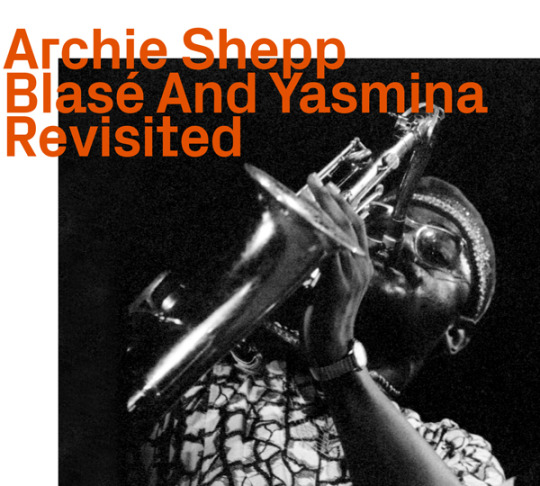
The Ezz-thetics campaign to keep the best of mid-20th century free jazz on CD shelves (yes, CD, not streaming or LP) breaches the walls of the BYG catalog with a disc that issues one and a half albums from Archie Shepp’s busy week in August 1969. Blasé is a stand-out for the participation of singer Jeanne Lee, whose indomitable and flexible delivery as equal to the demands of material that’s be turns pungently earthy and steeped in antiquity. But the rest of the band, which includes Philly Joe Jones, Dave Burrell, some harmonica players, and a couple members of the Art Ensemble, is also more than equal to the task of filtering the blues and Ellingtonia through the gestures of the then-contemporary avant-garde. “Yasmina,” which originally occupied one side of another LP, makes sense here as an extension of the raw, rippling “Touareg,” the last tune on Blasé, into exultantly African territory.
Bill Meyer
Juanita Stein — Snapshot (Handwritten)
youtube
Juanita Stein was the cool, serene, Mazzy Star-evoking vocal presence in the Aussie dream-gaze outfit Howling Bells, and she plays more or less the same role on her third solo album. Yet she is also the source of mayhem here, kicking up an angst of guitar-freaked turmoil on “1,2,3,4,5,6” then soothing it away with singing, hanging long threads of feedback from the thump-thump-thumping blues-rock architecture of “L.O.T.F.” and crooning dulcetly, but with a little yip, in the trance-y title track. This latter cut reflects on the death of her father, a kindred soul who wrote a couple of Howling Bells songs for her and passed away recently. It distills a palpable ache into pure, distanced poetry, finding a cool, dispassionate way to consider the mysteries of human loss.
Jennifer Kelly
The Tiptons Sax Quartet & Drums — Wabi Sabi (Sowiesound)
Wabi Sabi by Tiptons Sax Quartet & Drums
Over its 30 years together, the Tiptons Sax Quartet has done less to hone its sound and more to figure out how many styles to embrace. The group (typically a soprano, alto, tenor, and baritone sax joined by percussion and even including some vocals) can dig into trad jazz but sounds more at home in exploration, adapting world music or other traditional American styles. The title of their latest album, Wabi Sabi refers to the Japanese concept of finding beauty in and accepting imperfection. The Tiptons, despite that sentiment, don't approach their play with a sloppy sound; in fact, they're as tight as ever. The understanding of impermanence and imperfection does help contextualize their risk-taking. When they turn to odd yodeling on “Moadl Joadl,” they find joy in an odd vocal moment that highlights expression and discovery over formal rigor. When they tap in New Orleans energy for “Jouissance,” we can connect the dots between parades and funerals, celebrating all the while. The whole album serves as a tour of styles and moods, always with an energetic potency. If it's more of the same from the Tiptons, that just means continuance of difference.
Justin Cober-Lake
#dust#dusted magazine#arooj aftab#jennifer kelly#assertion#justin cober-lake#michael beach#bloop#bill meyer#bris#ray garraty#dreamwell#patrick masterson#paul dunmall#matthew shipp#joe morris#gerald cleaver#editrix#elephant micah#fraufraulein#bryon hayes#gerrit hatcher#rob magill#patrick shiroishi#A.Karperyd#tim clarke#kiwi jr.#kool john#nick mazzarella#quin kirchner
6 notes
·
View notes
Text
A few hours after her morning stroll, Apple, 28, sits in the lounge of the Mandarin Oriental hotel, her long hair damp from a shower and curled into a loose bun. Her eyes are so startlingly big and blue that a direct gaze almost feels accusatory. She's still in her trench coat, which she wears over a turquoise T-shirt and long black skirt. She made the mistake of having some coffee earlier and is a little shaky from the caffeine. She used to take medication for obsessive-compulsive disorder, but over the years, she's gotten better at handling stress. ''As frazzled and tired and kind of jittery as I am right now,'' she says with a smile, looking down at a trembling hand, ''I'm actually doing great and I'm very happy.''
After six years of silence, Fiona Apple finally reveals the real reason her mystery-shrouded ''Extraordinary Machine'' took so long By Karen Valby EW | Sep 23, 2005
Fiona Apple knows how to take care of herself. She has to go for a long walk every day or she gets a little crazy. So on a recent morning in New York City, she woke up at 4:30, put on sneakers and a navy blue trench coat, and left her midtown hotel. She moved slowly with her hands stuffed in her pockets, listening to her new iPod on shuffle, and the music in her ears made her feel like she was wandering through a movie.
She walked through Central Park just before sunrise, the light soft and gauzy, with Elliott Smith singing 'In the Lost and Found.' She walked to the Cathedral of St. John the Divine, where as a child she sang in Christmas pageants. She walked all the way up by Columbia University to her mother's apartment building, where Apple was raped in a hallway by a stranger when she was 12 years old. She kept walking and eventually found herself in front of the Dwight School on 89th Street, where she once worked as a receptionist while attending night school. Here her iPod randomly settled on 'Pale September,' a ballad from Apple's first CD, 1996's aggressively confessional Tidal. Normally she freaks out and skips her own songs. But today, looking at the place where as a teen she jotted down some exquisite lyrics that jump-started a multiplatinum career, she forced herself to listen.
All these years later, and back to the beginning. Which is really the only place to start a story about the mercurial artist, who vanished from the music scene after the critically adored 1999 album When the Pawn... and told herself she'd never return. Six years later, her new record, Extraordinary Machine, which was supposedly shelved by her label, which in its early stages was mysteriously leaked to the Web, which inspired elaborate conspiracy theories and a fan-driven campaign to 'Free Fiona,' is coming out. And Fiona Apple is finally ready to set the record straight about why she went away, and why it was such a battle coming back.
A few hours after her morning stroll, Apple, 28, sits in the lounge of the Mandarin Oriental hotel, her long hair damp from a shower and curled into a loose bun. Her eyes are so startlingly big and blue that a direct gaze almost feels accusatory. She's still in her trench coat, which she wears over a turquoise T-shirt and long black skirt. She made the mistake of having some coffee earlier and is a little shaky from the caffeine. She used to take medication for obsessive-compulsive disorder, but over the years, she's gotten better at handling stress. 'As frazzled and tired and kind of jittery as I am right now,' she says with a smile, looking down at a trembling hand, 'I'm actually doing great and I'm very happy.'
She knows what people assume about her: 'That I'm crazy. Annoying. Bratty. Sullen. All the things that I definitely am sometimes.' (During a two-hour conversation, she's also funny, frank, and self-aware.) She blames these perceptions on the 1997 MTV Video Music Awards, where she was named Best New Artist. Fresh off her breakthrough 'Criminal' video, in which she crawled moodily around in her underwear, Apple delivered an acceptance speech full of regret and disgust, telling the stunned room that 'this world is bullshit!'
'I felt like it wasn't my music that had gotten me there,' she says today, 'and I felt very resentful of that and of myself for that. It had been so important to me to get to this point, to be in this crowd, and once I got there I saw it wasn't anything I could really feel proud of. I thought that even if I can't articulate what I'm feeling, if I don't get up and say what's on my mind then I never will. So when I finished I felt great. But you should have seen the cold shoulders I got backstage. It was the moment where I realized that I was in control and could say whatever I wanted to. That is not something that makes people you work with very comfortable.'
Another often-mentioned low point is Apple's public meltdown at New York's Roseland Ballroom during a February 2000 stop on her When the Pawn... tour. Complaining that she couldn't hear herself, she fled the stage mid-show in hysterical tears, and never returned. (At a makeup concert several months later, Apple apologized to the audience, saying 'You said you wanted me to be self-confessional; I thought you said selfish and unprofessional.')
Sick of the public life ('I was cast in the crazy role and I was perfect for it'), heartbroken by how misunderstood she felt ('to feel hated is really, really awful'), Apple went back to Los Angeles and dropped out of the spotlight. When she and her boyfriend of three years, Magnolia director Paul Thomas Anderson, broke up in 2001, Apple moved out of his place into a house in Venice Beach. Other than a twin mattress in the living room that served as both bed and sofa, three dog pillows for her stray pit-bull mix Janet, a boom-box radio, and a TV monitor for videos, she left her house unfurnished for nearly two years. Tell her this sounds incredibly sad and lonely, and she says it wasn't really. 'I had so many other people's voices in my head that I just needed to take away everything.'
She took walks, she read plays, and she watched movies. But mostly Apple just sat in silence out on her lawn. 'You can call it a very long-drawn-out day-to-day meditation,' she says. 'I went through a period where I had a razor blade and was carving things out of wood. I would just do that all day, sitting there and thinking.' (Ask Apple if she was high as a kite out there on the grass and she laughs and says no. She admits to a short drug phase, when she smoked pot every day, but that was before this.) Friends needled her, saying she was wasting time and needed to get back to songwriting. 'And I would be like, 'No, this is exactly what I need to be doing right now.' I just had to sit there and figure the f--- out who I was. I didn't have an appetite for music in any way.'
Apple was ready to retire. But Jon Brion, who played many of the instruments on Tidal and produced When the Pawn..., who's worked with everyone from Kanye West to Rufus Wainwright, wasn't prepared to let that happen. 'This is one of my favorite artists alive,' he says. 'She needs to be out there.' Brion would casually check in about her work when they met for their weekly Tuesday lunch at Hal's, a restaurant in Venice. 'Most of the time,' she remembers, 'it would just be as simple as 'Writin' anything?' 'Nope.'' They went on like this for a while, until Brion finally broke down in the spring of 2002 and told his friend that she simply couldn't give up on music. 'You should really, really, really, really do this,' he remembers pleading. 'You really need to do this, because most other people suck.'
Apple gathered together some pieces for songs, songs that she says she 'wouldn't have finished until I was 50 or 60,' if Brion hadn't gotten her out of the house. 'I did need a kick in the ass,' she says. The two moved into the Paramour, a 1920s Los Angeles mansion on four and a half acres of land, for a few months. She wrote and finished a bunch of songs, and they settled in to record Extraordinary Machine. And while Apple says that she's incredibly proud of the work she did there with Brion, she just wasn't happy enough with it to release it as her third album. She decided she wanted to give these songs another shot?with a different producer. 'I just wanted to explore,' she says. 'If I did this song a different way, what would it be like? It was like moving into my house again: I really didn't know what color fucking couch I wanted.'
'It's an artist's prerogative to change their mind,' says Brion (only two of his original recordings remain on the finished CD). 'It's an artist's prerogative to be unsure of themselves or of anything else. It's just not that big a deal. My concern from the get-go was that there be another Fiona Apple record. I don't need to have more records with my name on them.' So Brion introduced Apple to his friend Mike Elizondo, a producer best known for his work with Dr. Dre, Eminem, and 50 Cent. Elizondo started noodling around with the songs, adding his own beats. Apple loved what she heard and wanted more. She went back to Epic and asked for the money to rerecord her album with Elizondo.
But by this time, Epic had gotten a first listen to the Paramour recordings and, according to Apple and Brion, didn't like what they heard. 'They wanted 'Criminal 2' and everybody knows it,' says Brion. 'Come on, she's 10 years older now! I told them, 'You have to look at Fiona like you look at a Thom Yorke or Bjˆrk. We're living in a time where there's a lack of really forthright artists, and the ones who are ? people really care about them and they're going to be there for them.' And [the response] was pretty much, 'If she doesn't have a single, her career's going to be over.'' (Michele Anthony, COO of Epic parent company Sony Music, insists that Apple 'is a rare and special artist who puts out albums that are bodies of work. She is not an artist where you worry about whether there is a hit single.')
According to Apple, Epic then told her that she could rerecord the album one song at a time. If the label approved a track she deemed finished, she'd get the money to record another. (A label rep denies this was ever Epic's plan but acknowledges that 'many things were likely miscommunicated to Fiona during this time period.') 'I fucking smell a rat here,' Apple remembers thinking, 'because let's say I hand something in that I'm happy with. They're going to own something that now I'm really happy with, which they can shelve if they want, or they're going to tell me, 'We don't like it this way, why don't you change this?' And that would be the death of me. No one's ever told me how to write a song before.'
Apple, who calls herself a compulsive self-doubter, waffled over whether she should work under the constraints of what she understood to be Epic's new deal. 'Should I do it? Should I not do it?' Then she came to her senses. 'I remember very clearly sitting in my house, going outside, sitting on the step, calling my manager and saying 'I'm not going to do it, I'm not going to do any of it. Forget it.' So where everybody thinks [Epic] shelved the album, that is actually when I just said, 'I quit.' It was the only thing I thought I could do.'
She wasn't bluffing. 'You could call it brave if it had been some strategy,' says Apple of her decision to walk away from Extraordinary Machine. 'When I wasn't sure I could put out the album, it hurt but it didn't hurt. I figured, 'Oh, that's just what was supposed to happen. I'll just find a new place in the world.'' She had done some volunteer work with kids with emotional difficulties years before and loved it. Now she filled out an application to intern for an organization called Green Chimneys in upstate New York, which uses farm 'therapy' animals to help troubled kids.
But then, in June 2004, two songs from the Jon Brion sessions ? the title track and 'Better Version of Me' ? were leaked onto the Internet. (Apple, Brion, and Epic all vehemently deny being the source of the leak.) Fans, who'd been waiting since 1999 with growing frustration for new music from Apple, went into an uproar. 'I was not thrilled with the idea that there was Fiona Apple music out there that I couldn't listen to,' says 21-year-old Dave Muscato, a Columbia, Mo., musician who a few months later launched FreeFiona.com, a site devoted to rescuing Apple's music from purgatory. 'We decided to do something about it and get a petition going.'
Apple was visiting her mother in New York last January when her manager called and told her about a protest being staged in her name. Muscato, along with 45 other die-hard fans, were picketing outside Sony's Manhattan offices, demanding they release her album. 'I remember very clearly going into the back room of my mother's apartment and my sister was sitting at the computer,' says Apple. 'I said, 'Look up Free Fiona.' First I started laughing, saying, 'This is hilarious, people are protesting and I'm sitting on my ass watching reruns of Columbo. I'm not on the phone with my lawyers trying to get my album released, I'm applying to Green Chimneys!' And then I started crying because I really felt touched. It's an incredible feeling to feel like all these people who you don't know care about you. And it was bigger than me, it was about what was going on in the music industry and anybody deciding what's sellable. And then I started feeling guilty, because it wasn't the truth. The album hadn't really been shelved. What was I going to do, tell all these people to stop, tell them that I had done the quitting? But I quit because I felt that what was going to happen was what they thought was already happening.' (Sony says that they would never have shelved her CD. 'We would have put out any record that Fiona turned in to us as a finished album,' says Anthony.)
But while Apple thought she could walk away for good, the pull of her unfinished album sucked her back in. She reached out to her former manager Andy Slater, who now heads Capitol Records, and asked him to buy out her contract. But those plans were thwarted in March, when a Seattle radio DJ somehow got his hands on the entire album and played it on the air. Fans promptly spread it on the Web. 'I had just gotten a computer and I found out that Extraordinary Machine was on there,' says Apple. 'My heart started beating really fast. It really f---ed things up. It made it so that no one could buy out my contract, because the album's already been heard. And I also felt bad because whoever did this thought they were doing the right thing. Because everyone thought that the record had been shelved [by Sony]. So I was torn between feeling like 'Thank you!' and 'God, no!''
Ultimately, Apple credits all the press attention from the Free Fiona campaign for spooking her label into finally giving her the money and creative freedom to rerecord the album on her terms with Elizondo. In June of 2005, three years after she first started working on Extraordinary Machine, Apple and Elizondo spent five weeks rerecording the songs in his backyard studio outside of Los Angeles.
The Free Fiona message boards are rife with speculation that Apple and Brion had a falling-out, that Epic forced her to cannibalize her record, and that Elizondo was a lackey brought in to gloss up Brion's work. 'Her fans adore her,' says Elizondo. 'They adore Jon. There's such a relationship there. It's probably what Beatles fans felt like when they heard they were working with Phil Spector instead of George Martin. But hopefully now they'll understand there's many different ways to be creative and make records.'
Brion has less patience for fans clinging to conspiracy theories. 'I almost feel like, Hey, anybody who got [Apple's unreleased music] off the Internet ? I understand your interest in hearing it. But [the finished version] is what she's putting out. This is the person you dig and this is what she thinks is cool and get on that.'
These days, Apple's Venice Beach house is nice and cluttered. It's a home she says she loves too much to ever leave. (She still needs a real bed to replace her futon, and a dresser for all the clothes she keeps in bags in a guest room, but there's time for all that.) She's been playing gigs at the L.A. club Largo with Brion on the acoustic guitar and Elizondo on the upright bass. And she stands behind her new record, and also the early version that leaked this year. 'I would not have dealt with any of this bulls--- if I wasn't proud of the songs that I've written.' And Sony is, says Anthony, 'just so happy and excited for her that she's finally done and she's happy with the record.'
Early stories about Extraordinary Machine painted her label as the big bad corporation that pushed around a vulnerable little girl. In the end, isn't it nice to know that she herself did the pushing? 'I've been in the driver's seat throughout this,' Apple says. 'Sometimes not driving. Sometimes not actually moving. I was stalled for a long time, but I've definitely been in the driver's seat. And by the way, that's something I learned very early on by giving a certain speech [at the VMAs]. I can make these decisions and no one can force you to do anything. No one could have tied me up and they couldn't have made me sing. You can't squeeze the notes out of my throat.'
Ask Apple if she's thought about what she'll say if she wins at next year's VMAs, and she claps her hands and leans in conspiratorially. 'Not enough people would get it, so I would never do this. But there's a part of me that would really want to make a completely sweet speech and then at the end say, 'This world is bulls---!'' Her big eyes light up at the idea and she bursts out laughing. 'I just think it would be really funny if people were like, 'Oh, God. Not again.''
Source [x] via Wayback machine current truncated version on EW.com [x]
72 notes
·
View notes
Text
Tourmates Jhené Aiko & Willow Smith Discuss Mushrooms, Magic & Industry Misogyny With Billboard
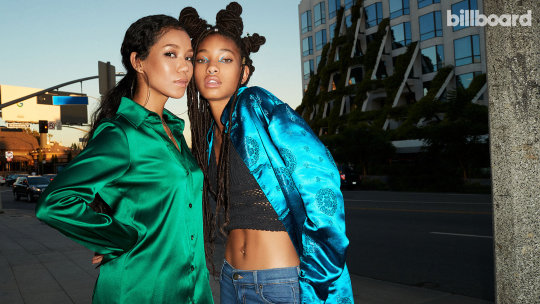
On a hot late-October evening at a rustic-chic Sunset Strip restaurant, Jhené Aiko lifts and considers a truffle fry before nimbly popping it into her mouth. Next to her, Willow Smith grabs four and crams them all in at once, so engaged in a discussion with Aiko about fantastical art that she exclaims, mid-bite, “Magic is all around us!” Aiko nods: “I learned that on mushrooms.” Smith fervently nods back: “Mother Nature did it for a reason: ‘Here’s something to woke ya!’”
Starting Nov. 14, Smith will support Aiko on her North American Trip Tour, named after Aiko’s latest album (and its accompanying short film), a sprawling psychedelic R&B concept piece about overcoming grief that reached No. 1 on the Top R&B Albumschart. Willow’s surprise second LP, The 1st -- released on Halloween, which is also her birthday -- swirls proggy compositions with left-field folk and soul.
Together, Aiko and Smith seem to embody a new breed of modern hippie: Aiko, 29, a self-proclaimed “NPR girl” in a loose sky-blue frock, steeping her chamomile tea bag with guru-like calm, and Smith, 17, vibrating with energy, in bell-bottom jeans and a black tee that reads in white text, “Got consent?”
But despite their age gap -- and the fact that one woman has been a single mother for nine years and the other is, well, the teenage daughter of Will and Jada Pinkett Smith -- Aiko and Smith have much more in common than an interest in the supernatural. Both were born, raised and home-schooled in Los Angeles. Both were signed as children and marketed to the mainstream -- Aiko as an adjunct member of R&B boy band B2K, and Smith as an actress (2007’s I Am Legend), then as a kiddie-pop star with 2010’s “Whip My Hair,” which peaked at No. 11 on the Billboard Hot 100.
Then, with money and fame hanging in the balance, they each walked away. Aiko took about six years off before starting an alt-R&B solo career flexible enough to allow for esoteric side projects like Twenty88 -- her duo with boyfriend Big Sean, whose self-titled album Aiko has described as “combining stuff like robots and sex” -- and a forthcoming poetry book titled Trip. Willow returned in 2015 with avant-garde soul album ARDIPITHECUS, and often posts genre-flouting collaborations on SoundCloud and a now-defunct YouTube channel (“Frequencies by Willow”) with everyone from The Internet’s Syd to her brother Jaden.
As plates of pasta arrive, Aiko and Smith dive into a wide-ranging conversation, often completing each other’s sentences as they discuss their respective decisions to, as Smith puts it, “take control of not just my music, but my life -- if shit goes south, it’s my fault, but if it goes good, that’s mine too,” and affirming their vows as artists to, in Aiko’s words, “usher in new ways of thinking.”
You last toured together in 2014. Willow, you were 14. What was that like for you?
Willow Smith: Coming out of the “Whip My Hair” days, that was the first time I’d ever toured with artists I listen to [in addition to Aiko, Syd and SZA]. I’d started playing guitar, and that tour really solidified: “OK, I want to be a live musician, to have a music career, for real.” Being around people who were so confident and so set in their artistry was a huge step in the direction of understanding who I really am.
Jhené Aiko: We did that for each other. I’d never considered myself a performer, but now I’m super into how I present these songs. This time, I want to take the audience on a journey, have them feel what I went through -- I want them to think they’re tripping balls. People like Willow and me, we’re super connected to this music and our message. We really want to change the world.
Jhené, what made her right for that tour three years ago?
Aiko: It’s crazy because just following her career and social media, I felt connected to her, especially seeing her talk about being an indigo and a star seed. I saw so much of myself in her.
Smith: Yeah. I’ve followed your music from the beginning and always loved how angelic and sultry your voice is. So when I heard that you wanted me on, I was like, “Whoaaa!”
Wait, let’s rewind a second. What’s this “indigo” thing?
Aiko: So if you look up in the night sky and see this light that’s flashing colors, that’s Sirius. It’s a star system, and it looks like there’s a party going on. What I like to believe in my dreams and imagination is, there’s some of us on Earth that come from there, indigos and star seeds, who are hyper sensitive to feelings and seasons, and in tune with each other without even trying --
Smith: Or even knowing. I’ve read and experienced that many indigos struggle with addiction and heartbreaking circumstances because this reality is not familiar to them. The density of the third dimension is so heavy on their soul, and they yearn to be light, to be in the stars. So you can --
Aiko: Free yourself from the physical and just be pure energy. I started singing when I was really young too, and touring when I was 12, so those were things I would think about and wanted to talk about, but I was home-schooled, so I didn't have many friends on the same level.

Willow, you were home-schooled too, right?
Smith: All my life, except from age 12 to 13 when a family friend was like, “Come to school with me. I’ll help you out.” But I live in the mountains, away from the city, far from people. It was literally me and Jaden in nature hitting cactuses with sticks, so school was really overwhelming. I was that girl: backpack half open, running through the halls, stressed. So I got to see firsthand how it shapes your psyche -- like how you’re always looking for approval. That’s the hugest thing.
Aiko: I started home school in the middle of seventh grade. I loved schoolwork, but the social part was too much for me. I’m a hermit, still. My family goes out, and I’m like, “I’ll be home staring at the wall ’cause I like it.” The past couple years working on Trip, I’d go on road trips or to festivals by myself, meet other wanderers. That’s why we’re doing this tour -- we’re on that wavelength.
I get the sense that there’s something deeper than a big sis, little sis thing going on here...
Aiko: Willow’s a being that has been here before, obviously. I don’t get age. I mean, I have a 9-year-old daughter who has this pure knowledge, and I learn so much from her. I feel like this is my 20th life because from the first moment I can remember, I’ve been over the kid things.
Smith: Yeah, I understand. I don’t know what it is. I felt that way too.
Have you given any thought to how you might spend downtime together on this tour?
Aiko: I want to make music. I’ll have a studio on my bus, and she can come through with her guitar. I’ve also been doing a group meditation the day of a show. I’m reading The Seven Spiritual Laws of Success by Deepak Chopra, and he talks about setting your intention. Mine is to calm people, but I get really nervous onstage.
Smith: What I think is really going to happen on this tour is, like, a feminine energy super bomb. This tour is going to be so potently feminine it’s going to warm your heart.
You’re both into poetry and philosophy. What about a book exchange?
Aiko: A book club!
Smith: I have always wanted to be in a book club. My entry would be The Red Tent by Anita Diamant. It’s about these sisters who lived a long time ago and this tradition of when the women menstruated, they’d all go into the red tent together. They’d have these crazy conversations and spiritual ceremonies and shamanic experiences. It’s about female camaraderie in terrible times.
Aiko: Mine is Peace Is Every Step by Thich Nhat Hanh. He’s a poet and monk from Vietnam. He tells beautiful stories to get across very simple messages. Like how people get agitated in traffic -- he teaches you to take each red light as a chance to breathe deeply.

I can see you two sharing music, too. Who’s an artist more people should know about?
Aiko: Michael Franks, a jazz artist from the ’70s. His voice is like butter, and his writing? So clever. I love jazz because of the range of emotion it can take you through in one track. I’m a fan of John Mayer for the same reason. For Trip, he came in with, like, 50 guitars, and for hours he was coming up with song ideas and melodies one after the other, nonstop.
Smith: Cameron Graves. He plays with Kamasi Washington, and his Planetary Princealbum is the epitome of each musician showing their uniqueness. Not a lot of my peers are open to music that doesn't have vocals.
Aiko: That’s my favorite. I think we should do a jazz album.
Smith: Let’s! Honestly, we can get a bunch of musicians in a room and just vibe out.
You were both signed young and could have followed very traditional career paths, but you took time off and came back to the business on your own terms. What was the moment you decided: “This is my own trip?”
Smith: When I said no to Annie [in 2013]. The script was written, we had paid people, the production was going to happen. A lot of people were putting pressure on me, and I was like, “I have to take the control.” That was scary, standing up to executives who were like, “What? We spent this amount of money. Mmm, you’re doing it.” And I was like, “No, I’m not going to. Sorry.”
Aiko: I was turning 16, and my label contract was up. Everyone assumed I was going to re-sign, but I knew that wasn't who I was going to be as an artist -- I wasn't satisfied singing songs other people wrote. Then when I was 20, I got pregnant. I became a waitress at a vegan cafe but was going through all these new things as a mom and wanted to make music about it. So I quit, and from then on, it was like, “No, this is my vision. You have absolutely nothing to do with this art.”
As young women of color in an industry that is hard on women and on people of color, where do you think that surge of confidence came from?
Smith: You have to see other black women doing them. That’s the only way. I went on tour with my mom when I was Jhené’s daughter’s age, and it was so empowering and beautiful.
Aiko: I never saw a distinction between a man and a woman. My grandparents and my mother were great examples of men and women, and they taught me equality. So I would fight with boys and wear my cousin’s clothes. I would do whatever I wanted, and that’s where I still stand today.
Smith: If you truly believe in equality, you know it up here. [Taps forehead.] It’s how you think. There’s a lot of women doing their thing, expressing themselves in ways I feel weren't possible before. At the same time, a lot of men still spit misogyny like it’s nothing. It’s a forever journey.
Women have been banding together lately to expose predators in the entertainment industry…
Smith: Yeah, and our president. Ahhhhhh! The creepiest dude of all!
Aiko: I’m pleased people are brave enough to come forward, because it encourages others. I’ve always been protected. My mom was my manager. Now my older sister is. Even when I’ve been in sketchy environments, someone always had my back. That’s important. In these stories these women are telling, there’s no real friends around. I have definitely experienced male ego...
Smith: And I’ve ran into situations with white men specifically who are like, “Black girls don’t usually look like you,” or, “Whoa, your hair is lying down. That’s crazy, you actually look pretty!”
What do you want the future of young women in art to look like?
Smith: I don’t want there to always be this stigma of the “female” artist. “Oh, what does it feel like to be a female doing something?” That hurts me.
Aiko: Because of that, a lot of young girls compare themselves to others. Growing up, people wanted me to do choreography. If it wasn't for a supportive mother, I would have been put in the same boot camp. You were born into your own lane -- don’t let anyone push you into theirs. I’m not going to stop evolving until I’m 80. Like, I want to go back to school for astrophysics.
Smith: The arts and the sciences! That’s my whole life. In the future, I think there’ll be a new kind of person who does both. Like... an imagineer!
Aiko: See? I mean, clearly, she’s in her own lane.
© Billboard
Written By Chris Martins / Photography By Nate Hoffman
43 notes
·
View notes
Text
Taraf de Impex and Fanfare Ciocărlia electrify Brixton with Balkan Beats
Forget about Roman London. Last night, London was proudly Romani. The Electric Brixton was packed to the rafters with well over fifteen-hundred frenzied punters as first Taraf de Impex, and then Fanfare Ciocărlia, brought a taste of the Balkans to Lambeth. 'Felicitări!'

Ask the average Brit on the street to name a Romanian contribution to the music scene and, sadly, you would be hard-pressed to hear anything other than the Cheeky Girls. Ask someone a little more erudite and, if you're lucky, they may have heard of Angela Gheorghiu, the soprano singer, whose version of Puccini's La Rondine is out of this world and a firm favourite among opera enthusiasts.

As it happens, many Brits and indeed people around the world will have heard Fanfare Ciocărlia's music before, though they will be excused for not realising they were Romanian. During the end-credits of the controversial comedy about a fake Kazakh journalist, Borat, cinema-goers heard their bizarre uptempo cover version of Steppenwolf's Born to Be Wild, originally made famous in the classic 1969 movie Easy Rider. However, with no prior knowledge about the soundtrack, most will have assumed, erroneously of course, that this was a Kazakh band. But Fanfare Ciocărlia are no more Kazakh than Hammersmith-born Sasha Baron Cohen. They are Romanian. Very, very Romanian. Given that the average Brit's knowledge of Romanian music is so poor, it is thanks to music promotors such as Kazum, the Romanian Cultural Institute in London, and the media company Romanians in UK, among others, to help set the record straight. And, in spite of the fact that the vast majority of the congregated throng appeared to be from the Romanian diaspora, a decent percentage of those voices I heard around me appeared to have London accents. So perhaps, in a few years time, and with more concerts such as tonight's, there will be less ignorance about Romanian music in general.
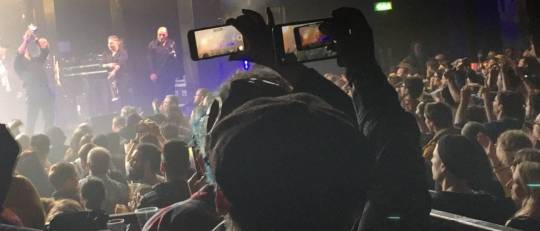
I first fell in love with this type of music via the outstanding opening to Emir Kusturica's Palme d'Or-winning Serbian movie, Underground, which came out in 1995. The classic comedy begins with a marching band running behind a horse and cart, playing Balkan gypsy music written by Bosnian composer Goran Bregović, who later went on to compose Ovo Je Balkan, the song that allowed Milan Stanković to represent Serbia at the 2010 Eurovision Song Contest. It is a scene that has stayed with me for almost twenty-five years and it introduced me to this genre.

It is not at all odd to discuss Serbian traditional music in a review about Romanian music. Balkan traditional music is very much intertwined across those many borders that have been defined politically. A brief look at Fanfare Ciocărlia's discography will reveal songs written by the legendary Romani Serb Šaban Bajramović (aka Šabi), and you must check out an album called Balkan Brass Battle, in which Fanfare Ciocărlia took on, battle-style, the Boban & Marko Marković Orchestra, a brass band from Serbia, which was recorded at the Pensiune Dracula hotel in the north of Romania in 2011, one of the classic albums from the Berlin-based Asphalt Tango Records, who were furthermore one of our many hosts yesterday evening in Brixton.
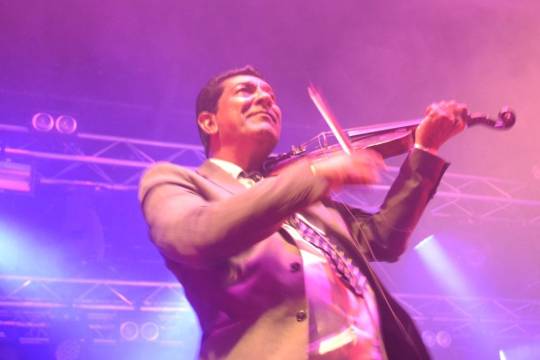
Gheorghe Anghel "Caliu", on violin
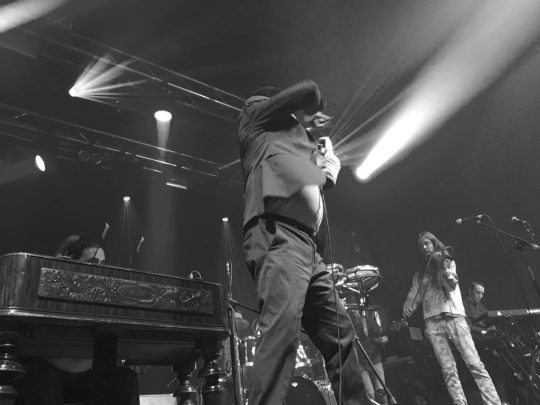
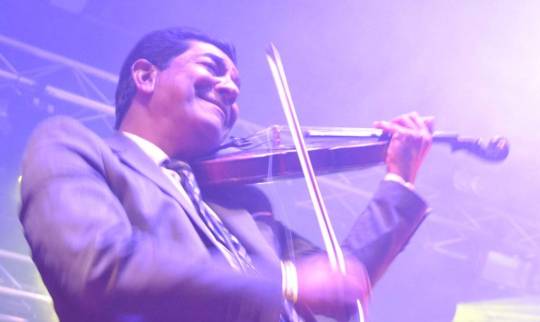
The evening started with a real treat. Taraf de Impex is a brand-new side-project of Taraf de Caliu, a group of lăutari (Romanian traditional musicians) headed by charismatic violinist "Caliu", which is the nickname of Gheorghe Anghel (no relation to the similarly-named aforementioned opera singer). Many of the other musicians bedecking the Electric Brixton stage were, like Caliu, former and present members of a rather more well-known group called Taraf de Haïdouks, who appeared in many movies, most famously Sally Potter's The Man Who Cried, starring Johnny Depp among others, who is a huge fan of the band.
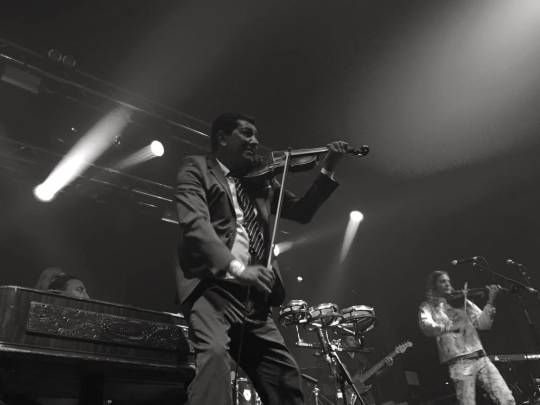

The best way to describe their music would probably be 'electro-Gypsy', though it's very hard to define it exactly. We were introduced to one song as being a cha-cha-cha, but it was like no other cha-cha-cha I had ever heard before. Many tracks were gloriously jazzy. Various guests were brought on, clearly luminaries from the Romanian gyspy scene, including Haïdouks' accordionist Marius Manole and some really unique singers towards the end who deftly showed how one can truly turn one's own voice into a musical instrument.

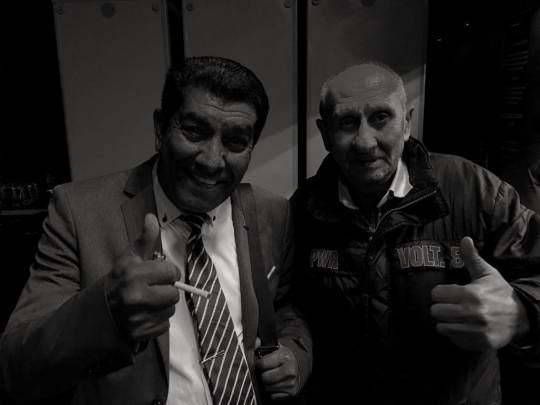
Caliu (left) and Marius (right)
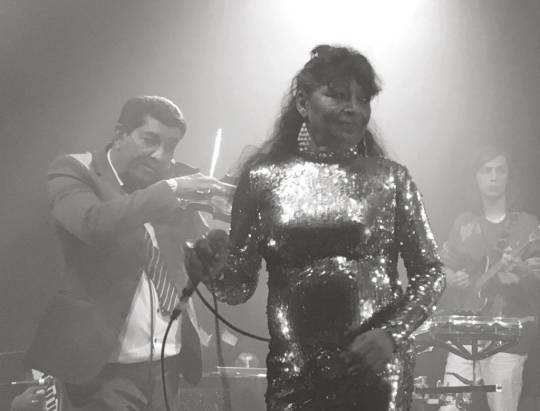

It was a joy to watch some of the traditional instruments come out, in particular to hear the cimbalom, a type of hammered dulcimer originally from Hungary and known in Romania as the țambal mare. This was a unique opportunity for most of the Westerners in the audience, though no doubt quite old-hat for the many Romanians who made up the majority.
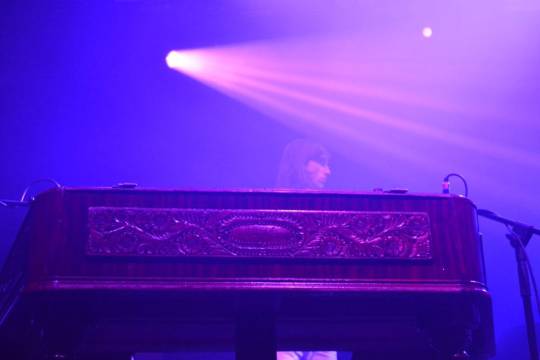
The traditional cimbalom, or țambal mare.
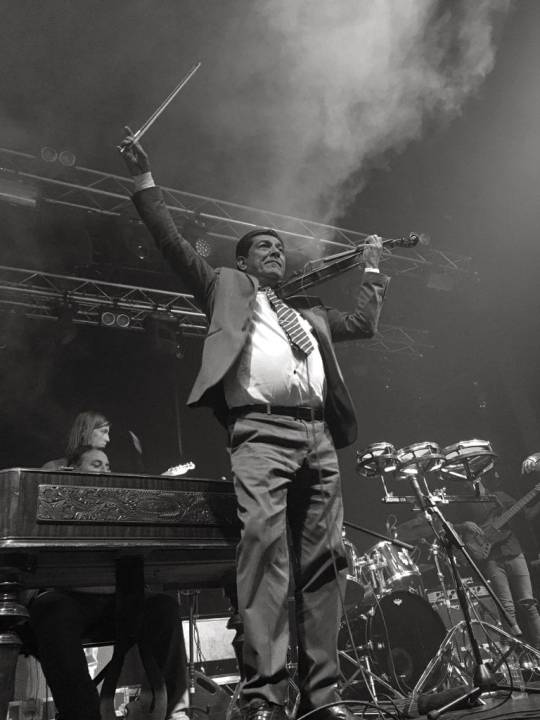
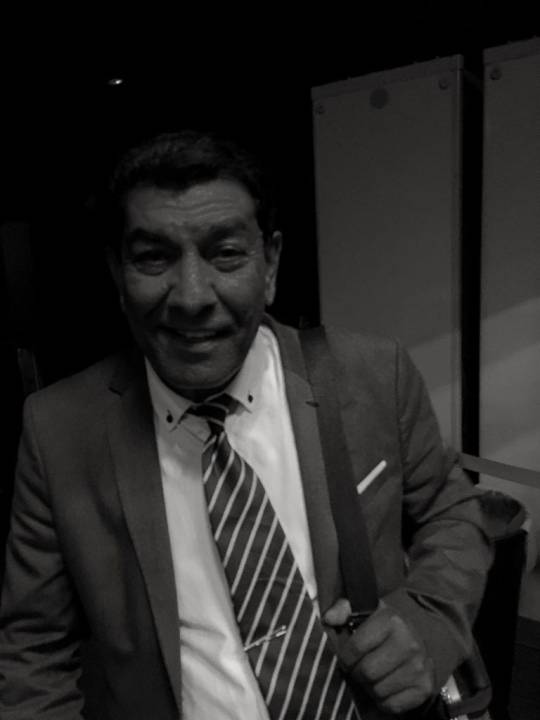
Following a short musical interlude of Balkan tunes courtesy of DJ Sacha Dieu, the main act came on to rapturous applause. Fanfare Ciocărlia began fairly low-key, with openers Toba mare and Sirba monastirea, the latter from their celebrated first album Radio Pașcani, but soon began to up the tempo in a way that only these twelve Roma musicians know how, including a number of tracks from their most recent album, Onwards to Mars!, including Saintes & Dates and Mister Lobaloba, the latter being as far removed from Mr Bombastic aka Shaggy's original song as you could possibly imagine.

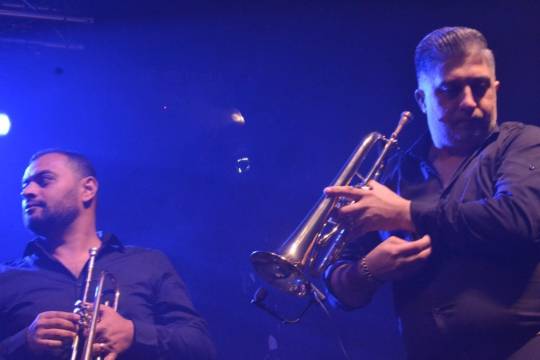

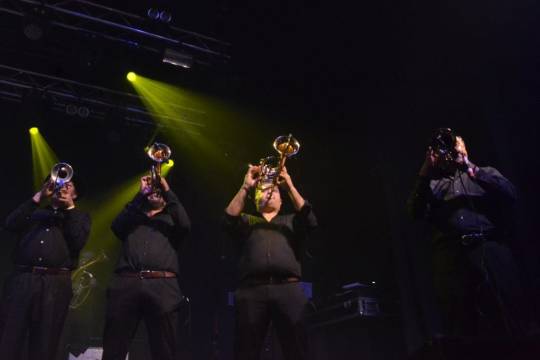
Fanfare Ciocărlia take to the stage As it happens, there weren't as many cover songs as we were anticipating. A blast of the intro to their version of Gershwin's classic Summertime was disappointingly short, as was their nod to the 007 James Bond theme-song. They didn't even bother with the Venezuelan classic Moliendo café, though I was most disappointed not to hear their famous version of Duke Ellington's classic Caravan, one of the many songs they played alongside the Serbian brass band on the aforementioned Balkan Brass Battle album of 2011, and which had previously appeared on their fourth album, the 2005 Asphalt Tango release Gili Garabdi – Ancient Secrets of Gypsy Brass.
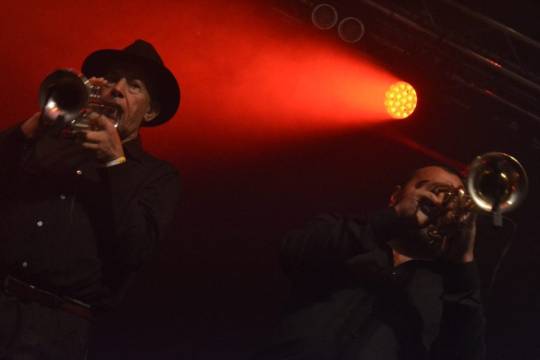
There again, with such a large back-catalogue, there were always going to be some disappointed people. Not that we could see many, however. All around us people were whipped up into a frenzy, with hands in the air, girlfriends on shoulders, coats and jumpers thrown around the auditorium. When the band finally played Born to Be Wild, the crowd went, well, 'wild', as foreshadowed from the song's title. Now, back in the mid 1990s I was a regular at this venue, then known at The Fridge. I was a devotee of the Goa trance scene, attending the legendary Friday-night parties Return to the Source and Escape from Samsara, as well as the odd Pendragon event. I have not, since those heady days, seen a more up-for-it crowd in this venue than I did last night. In fact, I would even say that they were on a par. Hands flailing around to the high-energy Balkan beats made trips to the bathroom hazardous, especially while carrying an expensive camera like we were. Plastic glasses of beer procured from the bar often did not complete their journey intact as they made their perilous voyage towards our vantage point. Although the smoking area on the top floor was packed early on in the night, so much so that people had to sit on the floor between the legs of strangers, as soon as Fanfare Ciocărlia came on, said area was completely empty, as this photo below shows. Indeed, in my three visits to the smoking area during their set, I did not see another soul.

The smoking area at the Electric Brixton, empty throughout Fanfare Ciocărlia's set Such was the power of this village band from Zece Prăjini in the north-east of Romania that that the hoards of erstwhile chain-smoking Romanians that had earlier filled the smoking area had decided to stay on the dancefloor, as though under a gypsy spell; a spell that had so captivated a sound engineer from Berlin who came across them by chance in 1996 – around the time I was dancing to Goa trance at The Fridge, as it happens. The rest, as they say, is history. Come 2012 they were entertaining the audience at the Nobel Peace Prize ceremony in Oslo. Ironic, as 'peace' is the last thing you can expect from this loud band. They are not called a 'Fanfare' for nothing.
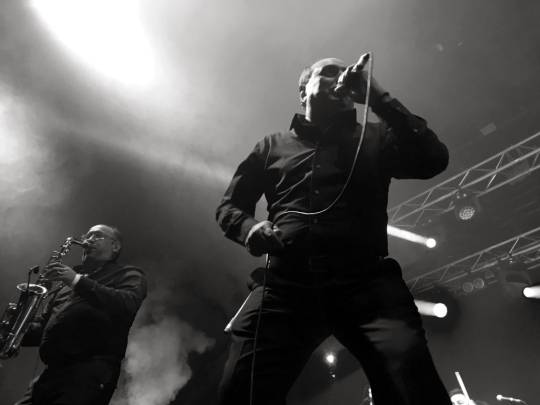
Born to Be Wild was swiftly followed by Iag Bari, the eponymous track from their third album, and two stage invaders began to dance with the musicians, which did not appear to faze them too much. As the security chased them off, the band was coming to the end of their set, which – unless we imagined it – included a short cover of The Turtles' classic Happy Together. Finally, to rapturous applause, they finally left the stage, but not before all twelve members decided to join the audience and play their instruments among the sweaty already tightly-packed crowd. Some members of the public even slapped notes onto the shiny foreheads of some of the players. This is a tradition that goes back some time, most notably at Balkan gypsy weddings, and commonplace at music festivals such as the famous Trumpet Festival held at Guča in Serbia, which attracts over half a million people every year and succeeded in leaving Miles Davis astounded. Below you can check out a nine-minute video we filmed last night, starting with Fanfare Ciocărlia's version of Born to Be Wild, followed by the band's promenade through the Brixton crowd at the end of their set. https://www.youtube.com/watch?v=q_Mfej5KxgQ Video of Born to Be Wild, followed by the promenade through the crowd Do check out the book Gypsy Music: The Balkans and Beyond, by Alan Ashton-Smith, which dedicates quite a lot to both Taraf de Haïdouks and Fanfare Ciocărlia as well as describing traditions such as the gifting of money to musicians as detailed above, and so delightfully reconstructed in London SW9.
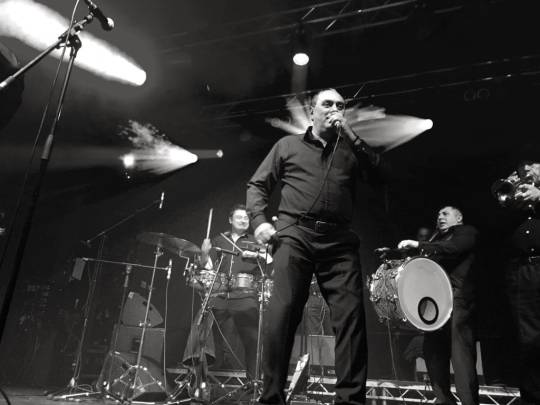
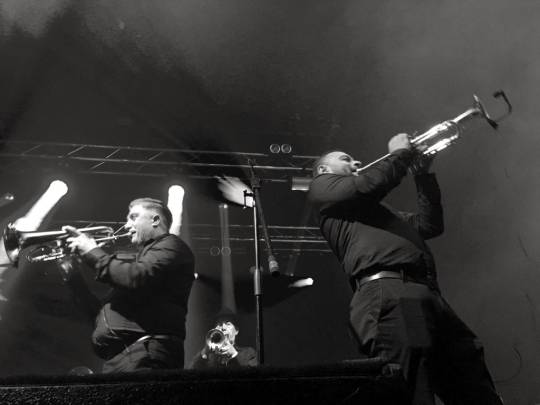
Kudos to Kazum and all the other promoters and organisers who made this fantastic evening happen, and for promoting Romanian music to a wider audience. Hopefully, one day the Cheeky Girls will no longer be the first to come to the mind of the average Brit when asked to name a famous Romanian musical act. A fantastic evening. Or, as the Romanians would say, 'Extraordinar!'

Read the full article
0 notes
Text
Break ups. Most people on this Earth has been through one or will go through one at some point in their lives and understand how unbelievably painful they are and how it honestly physically feels like you’ve lost an integral part of yourself.
My ex boyfriend of two and a half years broke up with me on the 7th December 2016. He may be reading this (however unlikely) so I’m not going to disclose too much information, but it honestly tore me apart and I’m still dealing with it to this day, over three months later. We met when I was sixteen in sixth form and got together when I was seventeen; it was like a fairytale for the most part. I thought he was going to be the guy I was going to marry, everyone told us what a beautiful couple we were, he was my best friend and my rock. Until… things started to go downhill and it ended halfway through my first year at university after managing his first year very well.
If I’m honest, I don’t totally blame distance issues for the break down, it was the little frustrations and lies and lack of equitable effort which all built into resentment. The actual break up, however, felt very sudden to me. I don’t think I ate properly for about 2-3 weeks after that and lost about a stone in weight. I hardly left my university accomodation apart from to go to lectures, when I could manage it, or when my friends forced me to leave the flat and do something. I couldn’t do anything without crying – I remember going into Tescos and I started crying in the middle of the wine aisle (how apt) and received some rather questioning looks from people. I felt like a part of my soul had been ripped out, and nothing anyone could say could comfort me: don’t worry, you’ll find someone else! You’re single now, embrace it! You’re beautiful, you don’t need a man to complete you!… which I came to learn was fairly common amongst people just coming out of a relationship: you just cannot see the positive in anything; like a constant cloud is literally following you around.
Recently I’ve been having some very down days about my break up and kept torturing myself on social media about it, and today I decided I should vent my frustrations and do something productive about it. I’m not a world leading expert, but I’m going to offer little pieces of advice on how to cope with it initially and as time goes on.
LET yourself be upset
People who you keep close to you and try to support you through your break up may tell you not to cry and to go out and keep yourself constantly busy when it happens. I personally don’t think this should be the case 100% of the time. LET yourself be heartbroken. Cry and scream and sob your fucking heart out. Listen to Adele/The Smiths/Amy Winehouse/Tom ODell/Sam Smith (etc etc) on repeat. Eat LOADS of chocolate/ice cream/crisps/cheese/any other comfort food you love (I didn’t… big mistake!). Watch sad films. Indulge yourself in the sadness for a bit.
But then you HAVE to do something with your life. When my break up happened, my friends at uni were my biggest rocks and I don’t know how I’ll ever thank them enough. About two weeks after it happened the last week of term whipped round and there were club nights every night, lots of Christmas parties and celebrations and festivities. So, even though I was so incredibly mentally, physically and emotionally exhausted my friends made me go out with them. We had a Christmas dinner midweek and after so much malnourishment it was the loveliest thing with the loveliest people to experience. The day after that, the university held their Christmas Ball in our on-campus nightclub and I got myself dressed up and started to feel a bit more human again. I drank a fair bit (which anyone who knows me, knows I’m not a huge drinker) and just laughed as much as I could.
Basically, what I’m saying… you are ALLOWED to be sad. You’ve just lost the love of your life, your partner in crime, your best friend… you’re obviously going to feel absolutely horrendous. But, it is just as important to remember you are still your own person and have things to get on with. The day I was dumped, I had a 2000 word essay deadline due the next day which I hadn’t started… pulled an all-nighter for it in the student centre, took breaks to cry and drink Red Bull and ended up with a 2.1 in it (I think I just turned superhuman and realised I couldn’t let it ruin my degree even though it had only just happened)!
2. Surround yourself with happy, bright, positive people
I personally think this is the most important aspect of a break up. At university I found this easy as I’d made some fantastic friends over freshers who I feel like I’ve known my whole life and they let me sob on their bedroom floors, kept me company whilst I did assignments, brought me lots of tea/coffee/biscuits, gave me so many cuddles, replied to my despairing texts in the middle of the night and would take hours out of their day to just give me advice and make sure I’m all right. I will never be able to repay them enough for this as I would not have started the moving on process without them, at all. So thank you to all of you who supported me… especially Maxine and Lea, you are two of the most kindhearted people on this planet.
Do not be afraid to reach out. People who love you will want to be there for you and make sure you’re coping with it. Family are so important – mine certainly were. My lovely mum drove two hours to see me the day it happened and answered the phone at 3 AM when I was sobbing, several times (sorry Mummy) and her and my dad would always offer me advice and support when I needed it. Thankfully it was nearly Christmas so I got to go home for a month and heal, which was really needed. Make sure you do not suffer in silence as this is the worst thing you can do, and things will start to fester in your head and you will overthink and torture yourself. Other people in the process are a key ingredient to things getting better.
3. Remove their social media
Now. I’m the biggest hypocrite ever for putting this as a piece of advice, but it is what you need to do. I found it really hard to remove my ex significant-other from all my social media, and I still have him as a Facebook friend (even though I’ve unfollowed him) but it is very necessary. I am very tech-savvy and can find things/search for things very easily, which was certainly a downside for me, as I would let myself stalk his social media, look at who he was tagging in posts and hypothesise about what new gals he may be seeing now (which I am probably 100% correct about, hahaha). But this will ONLY MAKE YOU FEEL LIKE UTTER, UTTER SHITE. I found myself comparing myself to girl/s I’ve never even met, hating people I hardly know, resenting my ex even further and making myself cry. A lot. Snapchat is especially important for you to remove them off, as you literally see what they’re doing at every hour of the day, especially if they post often, which he did. Same as Instagram – I blocked my ex on there more so I wouldn’t torture myself by looking at his profile constantly. It is only recently I’ve had this revelation, by the way… it can take a while to come to terms that you shouldn’t be seeing their new life and updates, but it’s so important if you’re ever going to move on. Blocking people they’re associated with is very important also, as you’ll probably see something you don’t want to see at some point (trust me). Focus on your own social media, post some fire selfies and share positive things with positive people.
4. When the initial pain has passed, really focus on yourself
From my experience, it’s almost impossible to feel totally yourself when the break up occurs. This is normal, as I said above. But after the initial, horrendous, sudden pain… it will start to feel more like a dull ache. Now, I can say, I have not fully gone through the break up process as I am still coming to terms with things and I have nights where I cry about him still. But I feel like I am on track with my own life a bit more now. I think it’s really important to remember the things you love, your hobbies and passions post-break up. If you love reading, search for as many new books to read as possible. If you play an instrument, play it more than you usually would. If you like keeping fit, go to the gym more often or go for a few more runs. Little things which make you happy can overall improve your general, day to day mood is vital!
Also, doing things which you may not have done in the relationship is a good idea. For some personal insight: I started to go out a LOT (and still do if I’m honest!) which I never used to, I changed my degree course to include a year abroad in my third year (which I’d have barely considered if I was with my ex as I would’ve wanted to stay with him), I got my nose pierced (which my ex used to hate on people) and I really like it, I make more effort to talk to people and enjoy myself and I spend too much money on myself/treat myself a lot (perhaps not so good financially, lol). The more you start to do things for you and not another person as well, the more you’ll start to feel yourself.
Listen to a LOT of uplifting music as well. I personally recommend Beyonce’s ‘Lemonade’ album; I feel like the most powerful woman in the world when I do and I feel it’s the biggest ‘fuck you’ to the person who broke my heart. I created a playlist on Spotify called ‘Strong Woman’ to pick myself up a bit (here’s the link if you’re interested.. https://open.spotify.com/user/1145806328/playlist/0lzoFqM9zcwo17KJuEnJeN) to remind myself I AM enough: break ups can make you feel very small, unattractive and worthless and it really helps give me that boost when I’m having a down day.
5. Remember… you are ENOUGH.
When you dedicate so much of your life to someone and they leave you, it really does make you question everything about your worth. Me and my ex were together for a long time considering how young we are/were so we kind of grew up with each others’ needs/wants/idiosyncrasies in mind (I especially did) – I even partly-based my university choice on where he was at the time (which worked out perfectly in the end… Essex is an amazing uni) so to have that ripped from you and standing on your own two feet is daunting and scary. But… it is totally possible. In hindsight it was a good thing I went through the break up at university as I had things to do and people to be around, whereas at home I’d have felt much more isolated. You are incredibly strong and resilient for going through it and someday you will come through the other side. When it happens, this is very hard to believe. But you need to have faith that you will pull through in its entirety: I’m still not there myself, but I can feel myself improving a bit each day and my confidence in myself growing, which if I’m honest, I didn’t have at all when I was with my ex. I care less about the small inconveniences and relish the little moments which matter.
Break ups: especially at university, how to start the healing process and look after yourself Break ups. Most people on this Earth has been through one or will go through one at some point in their lives and understand how unbelievably painful they are and how it honestly physically feels like you've lost an integral part of yourself.
0 notes
Text
Aug, Sep, Oct 2019 Reviews Roundup

photo taken on Nic Bennett’s phone
Catching the last song of Feeder at New Slang in Kingston, after Omid Dijalili at Outside The Box in Surbiton, on the first day of the month, lead to the welcomed return of Mumm-Ra the following evening at the Lexington. The band, who I had supported and been supported by, were on top form as they performed songs from both of those eras, whilst frontman, James 'Noo' New proved they should have been bigger stars.
A mid-week Outside The Box in Kingston, with Sara Pascoe, was followed by two nights at the Nile Rodgers' 'Meltdown' - 7 days of music at the Southbank Centre. The Thursday night saw The Mystery Jets showcase new material with some old classics in the Royal Festival Hall, before Johnny Marr did pretty much the same, with the classics being of The Smiths - some of which he was joined by his son, Nile, whom was named after the Chic curator.

Kero Kero Bonito at the Queen Elizabeth Hall there the next night were the best I've heard them sound as a full, live band. It's also the first London show of theirs in a few years which has not been a sell out, with the tracks taken from 'Bonito Generation' still gaining the best response.
After a Tuesday night visit from Ride at Pryzm in Kingson, we headed down to Brighton on the Thursday for The Rifles at The Komedia. With the majority of the set coming from debut LP 'No Love Lost' (suprisingly, their lowest charting album) and follow up 'Great Escape'. The 21-song-set was nearly cut short when singer/guitarist, Joel Stoker, fell off the side of the dimly lit stage.

I went to see the Rifles again on the Saturday at Victorious Festival in Portsmouth. This time, they were without their keyboardist so, there were no chants of 'Deano'. I had arrived early to see local girl, Jerry Williams, play on that same stage, where she was joined by her full band, featuring the bassist from Vambo. Tim Burgess surprised the crowd next, as he walked on with a darker shade of hair, and by performing a more enjoyable set than a Charlatans festival slot with some rarely aired solo material; like ‘Oh My Corazon’, from his 2003 debut solo LP ‘I Believe’. ‘Just One Kiss (One Last Kiss)’ and ‘Clutching Insignificance’ from latest LP ‘As I Was Now’ were other highlights, along with the rarely performed ‘Some Friendly’ Charlatans’ track ‘White Shirt’ in the 7 song set, cut short as not to run over time.

Republica were up next, over on the main stage, not triggering as many samples as usual, with, keyboardist, Tim Dorney’s iPad dying after the third song. I caught the end of Badly Drawn Boy before possibly the best set of the day from the Fun Lovin’ Criminals. Professor Green was rammed on the 2nd stage, before Steve Cradock stormed off the main stage after his guitar pedals failed to work during his performance with Ocean Colour Scene, leading to Simon Fowler’s solo rendition of ‘Robin Hood’ before the show was back on. Walking through a sea of youngsters coming from Lewis Capaldi, The Hives were up next with an entertaining end to the evening, after deciding not to stay for Bloc Party or Space to make the last train, catching some of Rudimental on the way out.

I did see Idlewild’s acoustic instore at Banquet Records the next day though, before Josh Widdicombe and Romesh Ranganathan came to Outside The Box in Surbiton. September saw Leah Weller at Holborn’s Pizza Express, with many there in the hope of her father being there, which he was. ‘The Entertainer’, starring Shane Richey and Dianne Vickers, came to Woking but there are much better shows on offer coming up at the Victoria Theatre.

After the first half of Brighton v Aston Villa, we left the ground to catch The Spitfires at the Hope & Ruin. Complete with a brass section, the band have grown from Jam copycats to claiming the Mod tag for themselves.

Following Scouting For Girls at the Fighting Cocks in Kingston on the first day of the month, we were back in East Sussex a week later to see MC50 open for Alice Cooper at the Brighton Centre. Celebrating 50 years of MC 5’s ‘Kick Out The Jams’, original guitarist, Wayne Kramer, performed to a packed out audience for such an early start.

I was back in Brighton the next night to open for Proud Mary at the Prince Albert before Frank Skinner the following evening at Guildford's G Live. Still one of the best and most relevant comedians around, he's still avoiding the topic of football, and only touches on his wide knowledge of music when talking to the audience about which genre their look could be inspired by. Bringing in snippets of material from his 'The Man With No Show' stint at the Soho Theatre, he has a bit for everything; betting that routines change from night to night.

We were back at G Live on the Monday for '70s Folk singer/songwriter, Al Stewart. Guaranteed to find most of his LPs in the Guildford record shop for £1, he was back in town- this time with a full band, who didn't have the best sound, and neither was the mix. Some of the stories and songs were the same as his last visit, with the addition of some new stuff and a different Beatles story - but we still haven't heard how he knew Yoko Ono before John Lennon did or about his flat sharing days with Paul Simon. Full of wit and charm, his glow came from moving to LA after the success of 1967's 'Year Of The Cat', which he performed tonight, with half of the set dedicated to that LP, along with a couple of tracks from its 1978 platinum follow-up 'Time Passages'. As before, it felt like he was playing the minimum he could get away with, which is odd for such a prolific writer but not as strange as ending with an unheard song he had written with The Beatles in mind, titled 'Eight Arms To Hold You'.

The following evening, the most moving play of the year came to the Richmond Theatre, in the shape of ‘Prism’. Starring Robert Lyndsey, portraying legendary film maker, Jack Cardiff, this emotional roller coaster highlighted his retired time with Alzheimer's.

After Stephen K Amos came to Outside The Box in Surbiton we returned to the Richmond Theatre for David Williams’ best page-to-stage yet; ‘Billionaire Boy’. A brand new cast took on returning characters in this fun-for-all-the-family show.

Nic Bennett
0 notes
Text
Rascal Flatts' Jay DeMarcus Launching Christian Music Label: Exclusive
Rascal Flatts’ Jay DeMarcus Launching Christian Music Label: Exclusive
Courtesy of Red Street Records Jay DeMarcus Jay DeMarcus, one third of superstar country trio Rascal Flatts, is returning to his roots with the launch of a new Christian music label, Billboard has learned exclusively. At a Wednesday (Oct. 24) afternoon press conference, DeMarcus is announcing Red Street Records and his first signings: veteran Christian hitmakers Avalon and newcomer Lauren James, a worship leader at Joel Osteen’s Houston mega church. “It’s been a long time coming. I’ve thought about doing it for several years and the timing just never seemed right and now the pieces fell into place,” DeMarcus tells Billboard, sitting in his spacious man cave at his Nashville home. “When you don’t have to force the pieces and they fit together naturally, it pretty much means the timing is spot on. I’m really happy about it.” DeMarcus feels it’s a good time to launch a new indie Christian label, and though he had talks with major labels about starting his venture as an imprint, he decided being totally independent was the way to go. “I feel like the business model has changed so much that you can do so many new things these days that you couldn’t even do 10 years ago,” he says. “With Christian music in particular, I feel the real estate is wide open for a new company to come in that really is unconventional and not beholden to a larger label that is controlled by a larger label and has to move slowly. We’re small enough and streamlined enough I feel we can move quickly on something when we are passionate about it.” DeMarcus has hired longtime associate Don Koch as general manager and retained Aaron Crisler of Conduit Media to handle publicity. He’s working on distribution and plans to lock that in within the week. “Don did our first demos that got me signed while I was at Lee University,” DeMarcus says of his 90s deal with Benson Records as half of the Christian music duo East to West with Neal Coomer. “He produced our records and we’ve remained friends and writing partners. We started talking four or five years ago about opening up a Christian label and the more we talked about it, the more we batted around some ideas about what we wanted to do. Things started to fall in place and here we are. I’m really, really thrilled to have somebody that is not only a good friend, but somebody that I can trust to run the business affairs of the label like I would if I were there every day. I obviously have a commitment still to the Flatts that keeps me busy, so I’m really excited to have somebody in place like Don.” DeMarcus will continue as part of award winning country trio Rascal Flatts with Gary LeVox and Joe Don Rooney, but will be hands on with the new label, writing and/or looking for songs and producing artists. “We are co-producing Avalon as well as Lauren,” he says of collaborating with Koch, who also works as a worship pastor at a Houston church. “I want the best for every artist, so if it’s me producing, that’s great, but if it’s someone else that has the vision for the artist and really captures the soul of who they are, then I’m wide open for anybody producing. I just want to be the kind of label head that gives the artist whatever they need to facilitate their heart and their vision.” This latest incarnation of Avalon includes longtime members husband/wife Greg and Janna Long, newcomer Dani Rocca and marks the return of original Avalon member Jody McBrayer, who left the group in 2007 due to health issues. “Obviously it’s a big deal for us to have an artist like Avalon to launch with,” DeMarcus smiles. “We feel it gives us some credibility out of the gate, which is nice for us to have.” DeMarcus has a lot of history with the veteran group. “Janna and I went to Lee together. We actually sang in the same group together so I’ve known her for a long time,” he says. “And Greg Long, her husband, was on Benson when East to West was there and we toured together. To have a friendship already in place and then let it evolve naturally into a business relationship with them has been a wonderful thing. We’re going to put a new record out on them the first quarter of next year.” Part of the reason he launched Red Street is because he was frustrated that he couldn’t find homes for artists he was excited about. “I ran into a lot of road blocks of not labels not wanting to sign artists because there simply wasn’t room,” he says. “The release schedules were so stacked up at Word, Provident and some of these other labels in town that there wasn’t enough room for someone like an Avalon to find a slot to release a new record in. I got to the point to where I got fed up with running up against a road block all the time of being involved with artists that I was passionate about, but couldn’t find homes for them. So it started to become clear to me that there was room enough for another label in town to do some good work.” He admits the Christian marketplace is different but he has realistic expectations. “It’s no secret that anybody who knows the music business knows that the numbers are substantially different in Christian music than they are in country music,” says DeMarcus, who has produced Christian albums for Jason Crabb, the Martins and Reba McEntire, among others. “But I didn’t get into this business for the monetary reasons. I got into this because I’m passionate about the music and the message. I want to be a part of putting some good back into the world and giving back to a genre that has been so good to me in my whole life. That’s really the driving force behind what we’re doing. I, of course, want to be successful. I don’t want it to fail and I believe that we are set up in the best possible way to succeed in that we’re not biting off more than we can chew in the beginning.” Koch and DeMarcus came up with the name Red Street Records. “Don and I kind of batted around several things and we felt our partnership had been really, for lack of a better word, divine intervention the way we came back together and our friendship had come full circle,” DeMarcus says. “We wanted something that reflected our desire to be in Christian music too and to spread that message, so Red Street is the street that brought us together and the street that is covered with the blood of Christ.” Though the label is currently being operated out of his Nashville home, DeMarcus is looking to open offices on Music Row and will be hiring a promotion team. “We’re making sure we’re being good stewards of what we have and smart about how we spend our resources, so that’s why I have my own studio at my place and we don’t have a building on the Row planting our big flag,” he says. “We want to sneak up on people. We want people to all of a sudden go, ‘What about this Red Street Records making some noise over here? We’ve got to check out what they are doing!’ So that’s my philosophy and hope for what lies ahead for us.” A longtime fan of Christian music, DeMarcus plans to give back to the genre he loves. “I always feel like I’m going back home every time I do work over there [in Christian music] because that’s where I started,” DeMarcus says. “I grew up in the church and loved contemporary Christian music. I go back to the early days of when it first started with the likes of Amy Grant and Michael W. Smith. Those people that really pioneered are heroes of mine. “It’s great to always ‘come back home’ and feel like I’ve never skipped any time,” he continues. “They’ve always welcomed me back with open arms. We just played the Doves the other night with Jason Crabb and they always feel like family to me. I want to be a part of bringing more visibility to the Christian music genre and give it some platforms that it may not have had before. I feel like as blessed as we’ve been with Rascal Flatts, I might be able through some of my own connections and avenues to give them some visibility in arenas they’ve never had before. That’s what I hope to be able to do.” DeMarcus is excited about being able to launch this new venture and continue his longtime run with Rascal Flatts. “I have been in Rascal Flatts now for nearly 20 years and the three of us are believers. We’ve always been believers and we’ve always felt like music has the power to help people through certain times in their life when they were in darkness or a bad season. I believe that Christian music has that ability to an even greater extent because the hope that we find in the Gospel is what I want to put back into the world. I found hope in it myself through very dark times. I am living proof and I know this for a fact that you can find encouragement and strength through the message that’s in Christian music because I’ve lived it. I just want people to know that this is not a statement from me trying to suggest that I’ve got everything figured out and that I’m perfect. This is a statement of saying quite the opposite. I know that I’m imperfect and I know that broken, fallen people need what Christian music has to offer. That’s what I’m trying to do with Red Street Records.”
Read More…
The post Rascal Flatts' Jay DeMarcus Launching Christian Music Label: Exclusive appeared first on TBNT Have The Solution.
from TBNT Have The Solution https://ift.tt/2Q1fT80 via Article Source
0 notes
Photo

New Post has been published on https://shovelnews.com/amanda-seales-was-always-smart-funny-and-black-finally-everyone-else-sees-it/
Amanda Seales was always 'Smart Funny and Black.' Finally, everyone else sees it.
By Helena Andrews-Dyer,
What happens to a moment deferred?
Does it slip through the cracks of YouTube, never to be replayed?
Retire to the island of old tweets to shrivel in the sun?
Or does it quietly gather a viral army of followers too big to ignore?
The secret may lie with Amanda Seales, a comedian (and actress, and singer, and poet and painter) who after nearly a decade is finally undeniably having a moment.
Perhaps you caught her schooling Caitlyn Jenner during Katy Perry’s “Dinner and Discourse” last year? How about her scene-stealing one-liners on HBO’s “Insecure”? Or her appearance on “Def Poetry Jam”? The stint as an MTV VJ? The guest appearance on Q-Tip’s last album? Opening for the Roots? Delivering that unapologetically black stand-up set on “Late Night With Seth Meyers”?
“I’ve had a couple of breakouts,” said Seales, 37, during a recent interview at the Watergate Hotel.
“Smart Funny and Black,” the live black-pop-culture game show Seales dreamed up in her living room, has landed in the plush and rarefied halls of the Kennedy Center. The show is a live Quidditch match of wits mashed up with SNL’s “Black Jeopardy” sketches and a three-piece band.
Confused? Basically it’s quintessential Amanda, whom for years the entertainment industry’s gatekeepers just didn’t “get.” She bursts onto the stage wielding a microphone and gold lamé leggings, the evening’s “headmistress.” During the show, two famous funny folks (Tiffany Haddish, Estelle, Bomani Jones and Angela Rye have been guests) compete in games written by Seales for the title of “Master Blackspert” by debating categories handpicked by Seales such as “baby hair” and “in da streets Barack Obama.” The show’s tagline: “By any joke necessary.”
It’s a celebration of blackness, and it’s been sold out for weeks. That’s because of Seales, who has more than a half million followers on social media, where she loves being her “authentic self” and her frequent posts — calling out racists, bad boyfriends and her domestic shorthair Lando Catrissian — have bolstered her career as a truth-teller who tells jokes.
The popular comedy tour is a big friggin’ deal, okay? This is also a familiar runway for Seales — being wheels up, poised for takeoff.
Calla Kessler
The Washington Post
People attend the question-and-answer session with Seales.
Calla Kessler
The Washington Post
“I’ve had a couple of breakouts,” Seales concedes.
“When you’re so multitalented,” explained Seales’s friend Bevy Smith, the SiriusXM host and fairy godmother to many, “it’s very hard for the entertainment industry to get it because they like you to have one note until they tell you you should try something different.”
Seales was first poised to break out in 2004. Then a 23-year-old hip-hop head from Orlando, she’d been hired to host “Sucka Free Sunday” on MTV2. It was her first brush with fame and paying rent when the rent’s due. The buzz was palpable.
Broadway star Brandon Victor Dixon, Seales’s “brother from another,” tried to prepare her for what was coming. “Are you ready?” she remembered him asking in an intense stage whisper.
“It was so dramatic,” recalled Seales between laughs. “And I was like, ‘For what?’ And he was like: ‘For. Your. Time.’ ” She cackled. “And within a year I was laid off — but it was a moment!”
It took Seales 10 years to get back to that level of fame. “Ten long subway train years,” she said. In between she made her own music, painted political art, produced funny Web series about pop culture and gave college lectures about street harassment. (Seriously, that MTV money paid for the last semester of her master’s in African American studies at Columbia University).
“I’m an artist through and through,” she said. “My thing about creating things is that it has to do two purposes: It has to serve me creatively but also has to serve the people.”
In 2011, another moment came. Hip-hop didn’t feel like home anymore. So she decided to dive into comedy for real. She changed her stage name from Amanda Diva (“it just felt stupid”) to her government name, Amanda Seales.
“I have a theory that when you’re lost on the path, go back to the beginning and try the maze again,” she said.
Michael Loccisano
Getty Images for HBO
Seales sings after the Cinemax screening, panel and reception for “The Knick” in 2014.
If there’s one thing Seales does not do, her friends say, it is wait for permission. At least not anymore. One network executive told her that she was “just another dumb talent” and that she seemed more like a “sidekick” than a lead. After being told by countless others that they simply didn’t know what to do with her, Seales had yet another aha moment.
“I don’t need to change. I just need to diversify my realness,” she explained at a question-and-answer session two nights before her big show in Washington. The crowd, gathered at the Wing, reacted with snaps and umm-hmms.
The Georgetown pit stop was a testament to just how diverse Seales’s particular (and quantifiable) brand of realness is.
On social media, she’s about authenticity. Really. That’s not a studio line or a gimmick. “I really just be in my house,” she explained to the crowd at the Wing, referencing her prolific “PSAs” in the form of no-makeup Instagram videos about “empowering your ego” and self-care. “And I’m single, so there’s time.”
Spend even a short amount of time with Seales and you can see why folks either love her or — well, she doesn’t really care about the other side of that proposition. The unfollow button is there for a reason. Her Instagram bio: “I’m not 4 everyone.”
“I really mean that,” Seales told me later.
She might not be “everybody’s favorite box of cereal,” said comedian Roy Wood Jr., another friend, but that’s the point. Seales has “built a career on swimming the other way,” he added.
“Amanda’s that relative who could come to Thanksgiving dinner and say, ‘Hey, y’all, I got something to say,’ and everybody’s like, ‘Uh-oh.’”
Bennett Raglin
Getty Images for BET
Seales performs during BET’s Social Awards 2018 in Atlanta.
So how exactly do you define someone who is a “a multi-hyphenate self-generator,” as Seales’s agent, Mark Gordon, calls her.
Seales is a one-woman show in the most literal sense; sitting across a couch from her, the space somehow feels crowded. Her face can cycle through a dozen expressions in as many seconds. She does voices (her Caribbean mom, the white girl, the publisher — yes, she’s coming out with a book). But she doesn’t code-switch. That’s not part of who she is.
“Amanda doesn’t like to be filtered,” said Valeisha Butterfield Jones, the global head of women and black community engagement at Google, who has known Seales since the two were coming up in New York’s hip-hop scene.
Less than 10 minutes into Seales’s “Smart Funny and Black” show at the Kennedy Center, the comedian had already put the white people in the theater on notice. “Know your place,” she tells them. The show, a celebration of black culture and black people, doesn’t exist to “soothe your guilt,” Seales added.
Then she took the crowd on a nearly two-hour road trip through African American popular culture and history. There were singalongs, shout-outs and sidesplitting laughter. Seales is headmaster, preacher, choir director, storyteller, ringleader. In her house, everyone knows the words to the “A Different World” theme song and everyone can hit that high note at the end.
By the time the third season of “Insecure” airs (the premiere is Sunday night on HBO), Seales will be nearly 20 shows into her “Smart Funny and Black: Lituation 101” tour. Of the 23 shows, 21 were sold out.
Is that success to her?
“Exactly what I’m doing is what success looks like,” she said. “I get to create on my own terms, on my own timeline, and I’m able to support myself and my mom and my cat comfortably.”
© The Washington Post Company
Actress Amanda Seales, who plays the tell it like it is character Tiffany DuBois on HBO’s “Insecure”, talks about her role on the show and her excitement to expand the character beyond what she describes as a “limiting representation” of black women.
Source: https://www.washingtonpost.com/lifestyle/style/amanda-seales-was-always-smart-funny-and-black-finally-everyone-else-sees-it/2018/08/08/57e7b9b8-9a79-11e8-843b-36e177f3081c_story.html
0 notes